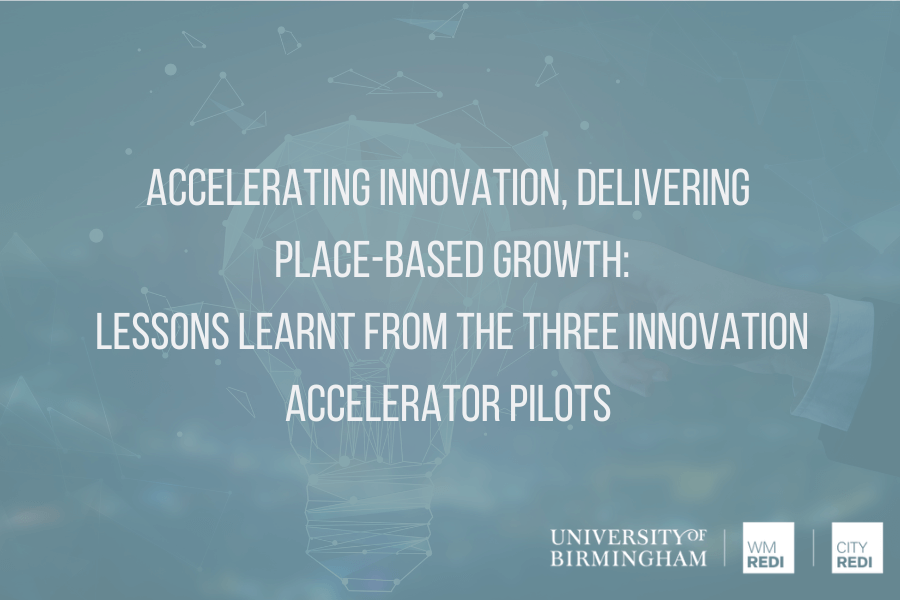Steve Barwick discusses a recent seminar held to identify early lessons from the three Innovation Accelerator Pilots in the West Midlands, Greater Manchester and Glasgow.
A recent seminar convened by City-REDI in partnership with the Universities of Manchester and Glasgow sought to identify early lessons from the three Innovation Accelerator Pilots in the West Midlands, Greater Manchester and Glasgow.
Attended by key national, regional and local academic and other stakeholders it was also tasked with clarifying the key questions politicians should consider if they want to take forward an agenda of place-based growth based on innovation and inclusion.
First the evidence. Three particular positives were noted:
The Innovation Accelerator Pilots (IAPs) have helped create strategic innovation partnerships and raise their readiness levels for collaboration and investment. In that process:
- Local government has taken a key role in defining and communicating the project prioritisation process and identifying the demands of the funding.
- University leaders have played vital roles. They have shared portfolios with partners and with each other enabling strategic discussion about priorities and collaboration. They have also produced evidence for investment priorities and impact evaluation.
- Business leaders have played pivotal roles both in leadership and within a range of sectors.
The three IAPs reflect different portfolios of innovation assets. The 26 projects which were funded reflect this diversity, which is welcomed.
The IAPs have also created a step change in working relationships between local and central government. The project selection and prioritisation process involved collaboration and co-creation, with greater respect and trust, rather than an arms-length, transactional approach.
But also three negatives:
- Industry partners found the process for project selection problematic partly due to lack of familiarity with Innovate UK systems, processes and timings and in part due to bureaucratic hurdles.
- There is a frustrating inability to align wider funding – such as for levelling up or net zero – due to inconsistency in Government approaches, including the tendency to favour competitive tendering methods. The linkage between innovation and inclusion is therefore weak.
- Activities which would have been innovative and worth funding were ruled out because of the structure of the demand for match funding within a too-short time frame and in some cases an aversion to risk. Of the 26 projects funded, most are therefore from the high-tech sector and favour larger businesses
Five lessons for the future were concluded:
- Within the working parameters of existing IAPs, it was felt that a choice had to be sometimes made between GVA growth and inclusive growth. There needs therefore to be an ability to see the wider place implications of IAPs so that vital spill-over effects can be created by aligning different funding, initiatives, different Government departments and approaches.
- The current IA model is supply-driven, therefore largely targeting big high-tech innovation. Although there are some green shoots of engagement with sectors that are typically defined as being lower in productivity, different selection approaches may be needed to facilitate a demand-side approach which would lead to scaling up SMEs and upskilling.
- The sums of money allocated – £33million per IAP – are not sufficient to make impacts on growth on the scale required. And, crucially, the timescales over which it has been allocated (3 years) are much too short.
- IAPs can help develop more robust collaboration opportunities and partnership governance structures to gather evidence, select, prioritise, and collectively agree on investments. They therefore provide the opportunity to build place leadership and soft infrastructure.
- A number of city region areas with developed capacity and mature governance would benefit straightaway from IAP designation and funding.
Questions for political parties and policymakers were identified, the five most important being:
- When should funding for existing Innovation Accelerator Pilots be fully devolved to Combined Authorities rather than the current nationally controlled model? And should funding be increased from £100million and made available over five not three years?
- How and when to roll out the IAP process further across the UK? Is there a case for an early second wave which might include Liverpool City Region, West Yorkshire, South Yorkshire and the North-East as well as Belfast and Cardiff?
- How should IAPs be re-engineered so they have a beneficial impact on jobs and productivity in the wider economy beyond technology-driven cluster development? In particular, how can IAPs better respond to local demand?
- How can innovation be more clearly linked to the Levelling-Up and inclusivity agendas in addition to the growth and net zero ones?
- How and when should the Government commit to the Innovation Accelerator process long term? Constant piloting means nothing is embedded despite the fact that innovation acceleration needs to become business as usual.
Read a full report of the meeting
These issues will be addressed at two fringe meetings that City REDI and the University of Manchester are organising jointly at the Conservative and Labour Party Conferences. Find out more about these events.
If you would like to reserve a place please email s.barwick@bham.ac.uk.

